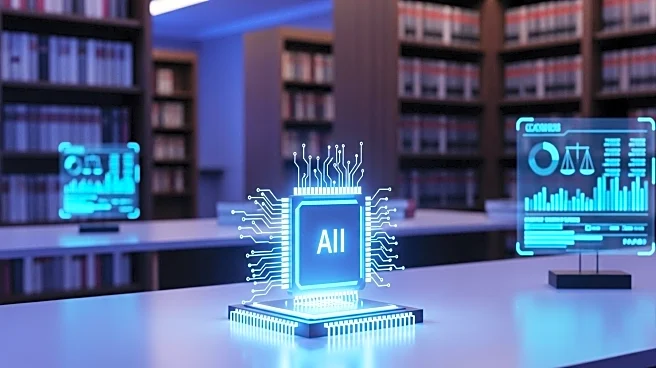What's Happening?
Law schools across the United States are increasingly incorporating artificial intelligence (AI) into their curricula to prepare future lawyers for the evolving legal landscape. This shift comes as approximately 30% of law firms have adopted AI-based technology tools, such as ChatGPT and legal research-specific platforms like Thomson Reuters' CoCounsel and Lexis+ AI. Despite the integration of AI into law school programs, experts like Daniel W. Linna Jr. from Northwestern University highlight that many schools are only offering basic training. The University of San Francisco School of Law has become the first to mandate AI education throughout its curriculum, partnering with companies like Accordance and Anthropic. This move reflects the growing recognition that understanding AI is crucial for law students, as AI tools are expected to transform legal practices and potentially impact job markets.
Why It's Important?
The integration of AI into law school curricula is significant as it addresses the increasing demand for AI-savvy lawyers in the legal industry. AI has the potential to enhance efficiency and accuracy in legal services, expanding public access. However, it also poses challenges, such as the risk of fake citations and misquotes in AI-generated legal filings. Law schools are under pressure to equip students with the skills to use AI effectively while preserving core legal expertise. This trend may reshape the legal job market, with AI tools excelling in tasks traditionally performed by new lawyers, such as document review and legal research. As AI continues to advance, law graduates with AI proficiency may have a competitive edge in the job market.
What's Next?
Law schools are expected to continue expanding AI education, with more institutions likely to follow the University of San Francisco's lead in integrating AI throughout their curricula. The American Bar Association's data indicates that specialized AI courses are becoming more common, and this trend is likely to grow. As AI tools improve and become more specialized, law schools will need to adapt their programs to ensure graduates are equipped with the necessary skills to succeed in a rapidly changing legal environment. The ongoing development of AI technology will likely influence the types of skills lawyers need, prompting further curriculum updates.












